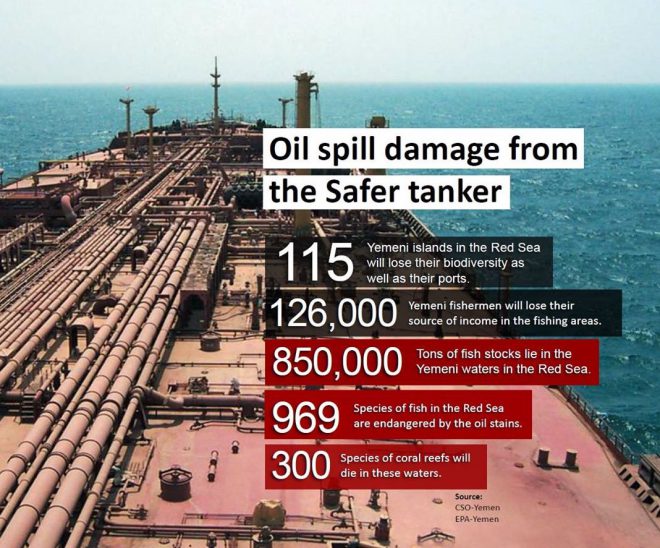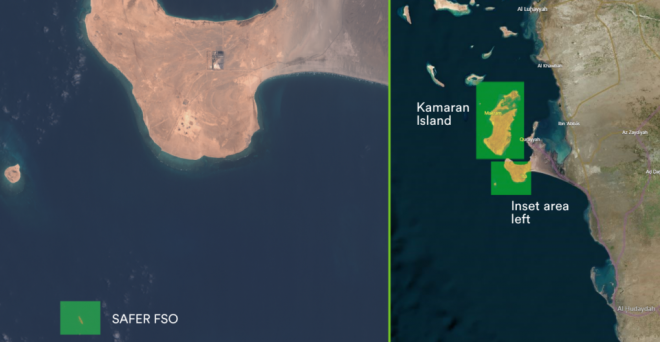The FSO Safer from above. It looks peaceful but it’s a floating time bomb and when it explodes or leaks could be worse than the Exxon Valdez. It is locked inside a conflict zone. Yemen needs international help. Image via Conflict and Environment Observatory
After witnessing neglect and the dire humanitarian crisis after the explosion in Beirut, Lebanon, Greenpeace and Green Prophet is urging the United Nations to help Yemen as an abandoned oil tanker there threatens to explode or dump more than a million barrels of oil into the pristine Red Sea.
Water recently entered the tanker’s engine room, now increasing the risk several-fold that the vessel would explode or sink. A temporary fix was found, but the United Stations said it could have led to disaster.
The one-time supertanker, built in Japan in 1974, sprung a leak in late May, the UN reports, flooding its engine room with seawater and threatening to destabilize the vessel and spill its cargo.
For now, the international community must come up with a response plan should an oil spill occur. The Safer could release four times more oil than the notorious Exxon Valdez disaster did, off Alaska in 1989.
Neither war-torn Yemen nor its neighbours have the capacity to manage and mitigate the consequences of such a huge spill – and private salvage operators will be reluctant to take on a job inside a conflict zone, the UN has said.
The Yemeni government has asked the United Nations Security Council for more help to prevent the FSO Safer – moored 5 miles off the Yemini coast since 1988 and abandoned in the Red Sea – from ruining the entire Red Sea.
What conflict wins
The ship was taken over by the Houthi militias in March 2015, when they took control of the coast around the port area of Hodeidah. The Houthi movement officially called Ansar Allah and colloquially simply Houthis, is an Islamic political and armed movement that emerged from Sa’dah in northern Yemen in the 1990s.
They are not allowing international groups to move the tanker.
“The growing risk that the Safer oil tanker could rupture or explode causing an environmental, economic and humanitarian catastrophe for Yemen and its neighbours,” the UN Security Council has admitted.
They called on the Houthis to “immediately grant unconditional access for United Nations technical experts to assess the tanker’s condition, conduct any possible urgent repairs, and make recommendations for the safe extraction of the oil”.
There are parallels here with Lebanon and the Hezbollah who are the likely owners of the thousand of tonnes of fertilizers that exploded last week in Beirut.
(Read: Hezbollah flaunts its support for the Houthis)

According to HolmAkhdar, CSO-Yemen add the EPA of Yemen, some 115 Yemeni islands will lose their biodiversity if the tanker were to dump its oil. More than 120,000 fisherman will be out of work, almost 1000 fish will be endangered, and some 300 species of coral reef will die.
The environmental group Holm Akhdar warned in June: “Yemen would need a long period of time to tackle the fallouts of marine pollution. The Red Sea ecology would need over 30 years to recover from the ensuing dire consequences of the oil spillage.”
Yemeni Foreign Minister Mohamed al Hadhrami has said that a leak on this ship could lead to “one of the biggest environmental disasters in the region and the world”.
A director at the government oil company in Hodeidah, said the FSO Safer “would be more destructive to the environment than the damage caused by the Exxon Valdez oil tanker in Alaska in 1989. An imminent environmental disaster awaits the Red Sea countries if the Safer oil tanker is destroyed,” he said.

Location of the SAFER FSO off the port of Ras Isa on the western coast of Yemen, 50 miles north of the port of Hodeidah. Credit ESA Sentinel/Bing
Greenpeace MENA Executive Director Zeina Alhajj wrote to Green Prophet and said:
“Time has run out on doing nothing to avert the looming social and ecological disaster that is the FSO Safer oil tanker. Inaction is no longer an option. The UN is our last, best hope of averting a catastrophic oil spill in the Red Sea. It has all the influence and expertise to solve the problem and Greenpeace urge the Secretary-General to make repairing the tanker and removing the million barrels of oil on board a priority.
“Unless the UN act we risk sleepwalking into a disaster of international significance that will heap even more misery and suffering on millions of Yemenis.”
Meanwhile, the Houthis and then the Saudis are doing terrible things to Ethiopian migrants in Yemen. Read this Human Rights watch report.
Want to take action in cleaning up the sea? The UN has a new investment guide for bankers. We learned that banks are supporting the burning of the Amazon, whether or not investors at the bank are aware. Be one step ahead and invest in the sea, with this handy toolkit and guide you can download here.




